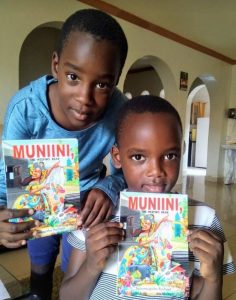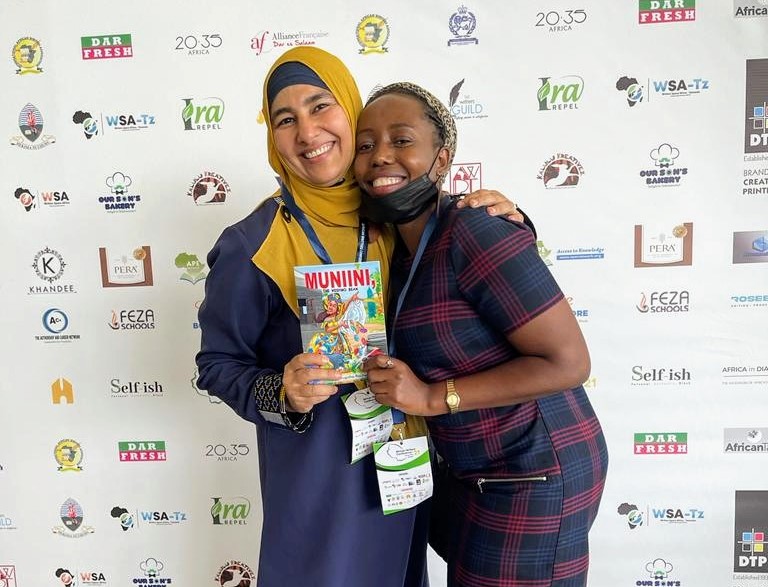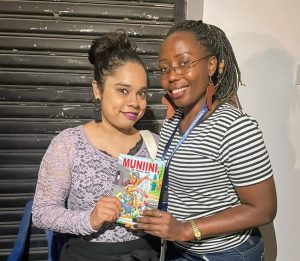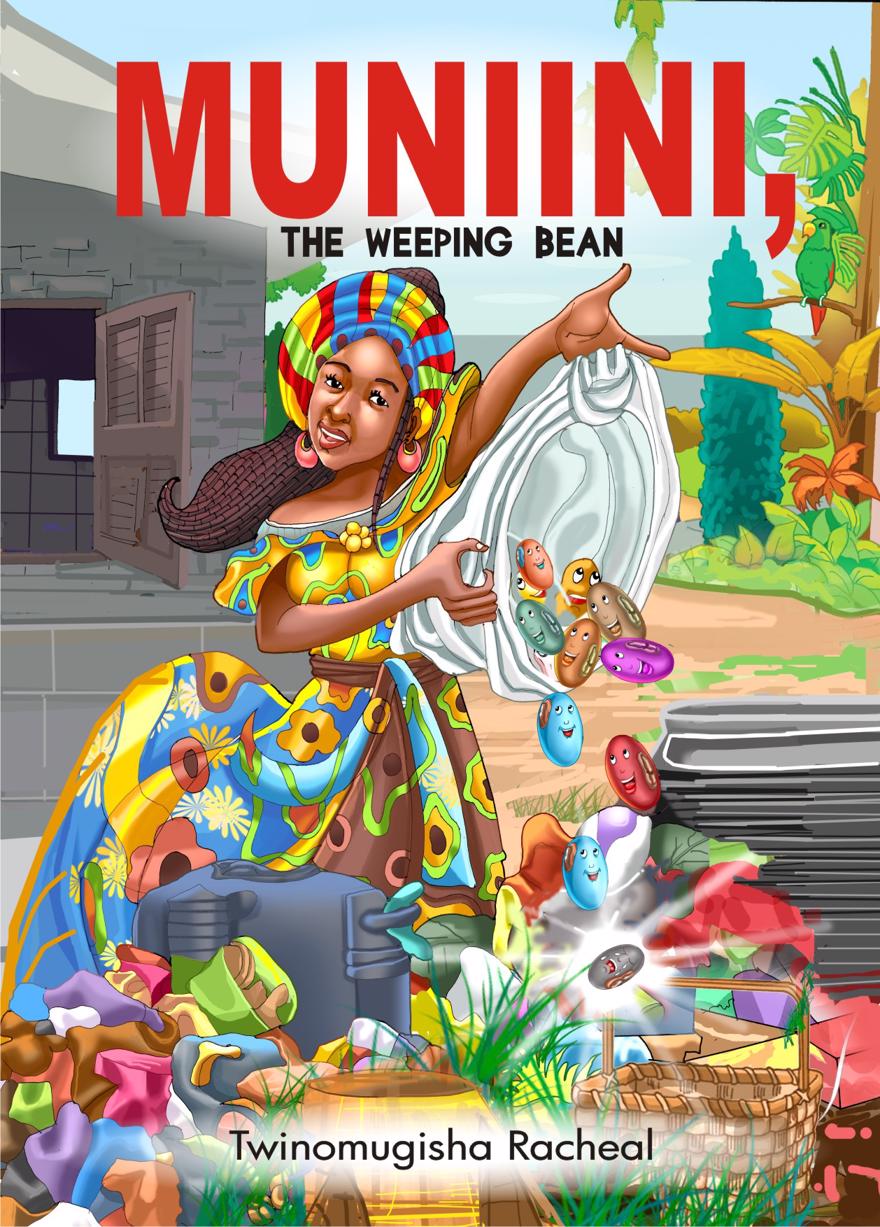As part of our drive to promote and encourage the writing, reading, publication and popularity of African literary works, Writers Space Africa Magazine is introducing an interview corner where we will host African Writers from across the continent. In this January edition, we bring you a beautiful and delectable writer, author of Muniini the weeping bean and founder of Tale Time Africa all the way from Uganda. Her name is Rachael Twinomugisha.
– Blessing Peter Titus (PPBlessing)
PPBlessing: Who is Rachael Twinomugisha please?
RT: Rachael Twinomugisha is a girl yet about to know herself better, so you have no assurance you’ll know me so well. I am a passionate writer of children and young adult stories. A teacher by passion, a lawyer by profession, an adventurous traveller and a warm heart to be around.
PPBlessing: You are certainly an interesting person. When and how did you get into writing?
RT: Unlike many other people, I started writing at 18. I was in high school when I wrote my first poem. I thought it read beautiful and so did my teacher and classmates in our little Literature in English class. I wrote a number of poems while at school and when we took our holidays, I fought to draw in words everything I’d seen that interested me. I summarised every experience into a poem until the poems started boring me a bit (reading so normal) that I challenged myself to write stories. The idea was always for someone to see vividly what I would be talking about. That is when and how I started writing, officially.

Fans of Muniini
PPBlessing: Okay… How about unofficially?
RT: I wrote before I even joined school. I drew things in my book because I badly wanted to write. Once I’d joined school and learnt to write, I went back home almost every day to write whatever interested me at the back of my book. Until I took up writing seriously, the back of all my books were always full of simple notes from events I loved. If you checked now, every photo in our album at home has something inscribed at its back. I wrote what would have happened the day a particular photo was taken, or what event we would have been celebrating when we took that. I also marked days and dates at the back. That was me being a nonfiction writer – unofficially. Unofficially, we also wrote stories in our English classes in primary and secondary school. I didn’t think this made me a writer though because everyone else wrote.
PPBlessing: Wow! So is it safe to say you’ve been writing since you knew how to write?
RT: Matters exactly what I’ve been writing. [Laughs] I love to say I started writing at 18. That was when I had my mind to it. At 18 by the way, my Literature in English teacher tasked me to write a poem for one of the professors that had taught him at University. It was a birthday present. The professor loved it. I also wrote a poem on the theme of materialism among teenage girls. It was used in a presentation at our school then. That was when I knew I was actually writing.
PPBlessing: You’ve been making giant strides a long time ago. You mentioned earlier that you are a teacher by passion and a lawyer by profession. Since you knew you were passionate about teaching, why didn’t you study to become a teacher instead?
RT: It was pride, it was public opinion, it was family. To start with, teachers are the least paid Professionals in Uganda, so “I wasn’t going to doom my life while I watched.” The public also sees the profession as a not so good blessing since it doesn’t earn them money. In fact, once you tell your parents here that you’re going to study for a degree, diploma or certificate in education, you worry them. I didn’t want to be the one worrying my family. (Laughs)
I first taught a few weeks after I’d joined nursery school back in Kawempe, Kampala. My teacher, Madam Monica, had taught me how to write, count, add and subtract immediately after I joined school. I went home to make a small blackboard using the battery cells powder on the little board I’d found in our store. I had chalk. I always picked the tiny pieces the teachers would drop in class. Once my blackboard was dry, I was ready to teach my little brother what teacher Monica had taught me. Our second class had over 8 children. Every child in the neighbourhood attended my class. Of course, I think they always looked forward to the play we’d have immediately afterwards, but there I was, teaching.
Later, my friends at school (primary, secondary and high school) always came to me to explain chapters they’d not understood well in class. They always stressed that I explain well. A number of teachers also mentioned that I would make an amazing teacher of the English language, Literature in English and of history, but here I am, a lawyer.
Finally, I was quite a good performer and my family suggested that I study law since I’d pass it with ease and be able to mint money easily. Aside from Law, I had be studying journalism and not education instead. Barely did I know I was called to serve.

Rachael with the Award-winning Tanzanian Author, Nahida Esmail at the 2021 African Writers Conference
PPBlessing: This is interesting. I think it’s one of the dilemmas a lot of young people face in Africa, studying a course that is deemed respectable as opposed to studying what they are really interested in.
RT: Yes. But even at that, I should have studied journalism and not Education. Only if I’d had a mentor!
PPBlessing: Well at least now some other young chap will be saved from some of the stress by reading your experience and hopefully, getting mentored by you. Still on teaching, you’re the founder of Tale time Africa and I understand it is specifically for children. Can you shed more light on it?
RT: Yes, if there is any glory or pride teaching has brought me, it has been Tale Time Africa, the African child’s story school. I started Tale Time Africa in September 2020. The idea was to have a platform that allowed children to tell their stories and taught them how to. You’ll notice that in my case, for example, had I had a mentor, I would have become an amazing writer at a much younger age… maybe. I only didn’t mention that all this time I didn’t write, I was always busy creating stories in my head and sharing them with my friends. I created stories to entertain, to teach and to bring back hope – a counsellor of sorts. I can only imagine if I’d put these stories in writing, a number of other people would have benefited from them, but they stopped where I told them.
The other idea behind the creation of Tale Time Africa aside from the fostering of creativity is the mental health of children. Writing brings relief. A problem shared is a problem half-solved and we all know that the modern-day parent barely has time for his/her children. So if the child is able to put his/her story or pain in writing, then surely, salvation will come his/her way. The grand reason behind the creation of Tale Time Africa is the preservation and promotion of African Literature at a tender age.
PPBlessing: This is wonderful. Thank you for promoting African Literature and helping our children learn to not only read but to write their stories too. How has your passion for teaching been used at Tale Time Africa?
RT: I’ll answer this with the question you’ve not asked me. People ask how one is able to write children’s literature, for example. My answer is always that for you to be able to write a story that children will enjoy reading and relate to, you have to be a child in the first place. Brings me to your question. Teaching at Tale Time Africa is learner-centred. It is a learning contract kind of setting. I remember our parents didn’t first understand for example why I ask children what they want to do at the beginning of every class. We have activities like story writing, storytelling, debates, quizzes, public speech, instant story creation (where you use the objects; toys and dolls given you to create a story instantly.) You tell that story and later write it. We run on a weekly timetable but even when I’ll know it is debate and maybe quiz today, I’ll ask the children what they want to do. We’ll go by majority vote, do that for a few minutes and then do what we were actually meant to do. By doing so, you’ll have their attention because you prioritized their opinion. They will enjoy the next lessons, make maximum use of them, and will never find school boring.

Rachael met with Neelam Babul, a columnist with the Citizen Newspaper, at the 4 edition of the Writers Mingle in Tanzania.
PPBlessing: You are indeed setting up new paths in teaching and learning. Thank you for sharing these useful tips which I believe schools can imbibe to make learning a more worthwhile experience.
RT: The pleasure is mine.
PPBlessing: Your book, Muniini, the weeping bean which you recently published has been buzzing all over social media, can you tell us about its birthing process?
RT: I wrote a number of stories between March and May 2020. That was around the time most African states were totally locked down due to the Covid-19 outbreak. Uganda was under lockdown. That meant that you could only go as far as your feet could take you. I used the time to create stories and Muniini, the weeping bean, was one of those creations. It tackles the life of a rejected bean. She -Muniini – is rejected because of her size. She is the smallest bean in Mrs Kanyama’s bag. She has no hope as everything around her indicates that her sad end is nigh. What is intended for her end, however, brings her the biggest blessing of her life. I thought about the lives of many people out there that were going through situations they had no control over. In my bedroom, where I spent most of my time as I had to isolate from everyone else because I had just returned from Nairobi which had Covid cases already, I wondered if these situations around us are always really our end. I wrote the story to talk to souls, to encourage them and sprout dreams anew. That same year, Muniini landed in the hands of a publisher who felt the world needed hope from it.
PPBlessing: From publishing until now, how have you managed publicity and sales considering the stereotype that Africans don’t read?
RT: While Muniini got edited and published, I was excited mainly about how its marketing would be. I knew for sure that I had to challenge myself out of every comfort my life had ever known if Muniini was “to be read.” Thanks first of all to my publisher, publicity came easy for me. Acacia publishers have made the book popular. If there is any book you never have to judge by its cover, then Muniini isn’t that book. People loved Muniini from its beautiful cover and have not been disappointed reading it. These people refer many more readers to me. Then there has been the blessing of family and friends. Those ones pre-ordered the book even before I had seen the final copy. You said Africans don’t read. I don’t know if they were going to read the book or not, but they ordered it and have since got copies. Tale Time Africa also brought in sales from our dear parents. That’s what people have done. As for myself, I have used social media mainly to publicise Muniini as our country has been locked down and I couldn’t do much beyond social media. This has brought me readers from near and far. Muniini has been read in over 9 countries so far and this has been mostly by the power of social media.
Aside from social media, I’ve visited bookshops, schools, libraries in different places, including in Tanzania where I attended the recently concluded African Writers Conference and left copies of Muniini not only with individuals but with bookstores, organisations and schools too. So I’ll say Africans read. Muniini is being read.

Book Cover of Muniini, The Weeping Bean
PPBlessing: It is beautiful collaborative hard work, well done! Moving on, what will you tell Writers who are sceptical about publishing their books?
RT: Have a mentor, have their opinion. I’ll not do the motivational speaking habits of ‘go ahead and publish the book’ because if it isn’t a good enough book, it’ll only slow down such a writer’s journey. So please, find a mentor, consult writers you trust and have their opinion on your book, and once they’ve approved your story, please go ahead and hunt down a publisher, or may they hunt you down.
When we published Muniini, I’d had another story in my preference. It was a happy and very hilarious story. My publisher insisted on Muniini. We sought the opinion of other profound African writers from West, East and Southern Africa. They also chose Muniini. I didn’t want to enter the market with a not so happy story, but here we are. Who knows, maybe my other story should not have done as well! Also, pray for guidance always.
PPBlessing: When are we expecting this other book to be published and are there any others too?
RT: This other story could come out in a story collection around August next year, fingers crossed. A number of my stories have been published in the Writers Space Africa magazine, I have two nonfiction stories published in the Twaweza anthology, and on a number of other platforms.
PPBlessing: Recently, Muniini was nominated for an award, can you tell us more about that?
RT: The Janzi awards are a national award here organised by the ministry of gender, labour, and social development, the National Cultural Forum, and other stakeholders. The award covers everything artistry in the land of Uganda, including music, books and publishing, visual arts, comedy, drama, name it.
Muniini, at 3 months old was nominated for the Janzi awards in the outstanding children’s storybook subcategory of the books and publishing category. For a three-month-old book, I must say I was overwhelmed by the support given us in the nominations and voting time: my special thanks to Writers Space Africa members, my people of Rubaare, Edith, Dissan, Comfort, Rosset, Anthony and Alexandra, Cohens, Colyvas, and Omadang, Sandra, Brian, and Henry Ssekajja Ronald, president Writers Space Africa – Uganda to mention but a few. We didn’t bring the award home, but we brought so much popularity for the book and our platforms in return. It was such an amazing marketing platform the awards gave us.
PPBlessing: How do you feel about not winning the award?
RT: It has been a celebration for me since I learnt that our Muniini was nominated for the Janzi awards. I’m still celebrating the nomination. At the awards, we learnt that there had been over 750,000 nominations in total. I can’t start to imagine how many of those were in my category, but the mere fact that we got nominated for the award was already so much victory for me.
The other bit I found really humbling about the awards was the winner of that particular award. Mr Walabyeeki Magoba has written children’s storybooks for 48 years now. In that time, he has been on the radio running children’s shows. Learning that I was put up to compete with such a renowned and celebrated servant of our land, humbled me. How do I feel? It’s a celebration. I think this has much to say about my kind of work and the reception it’s being given.. (Alhamdulillah).
PPBlessing: What’s the next steps now after these?
RT: There’s always one next step for a writer: to write, write, and keep writing. Watch out for another of my books coming next year around August. Acacia publishers will grace your eyes still. Also, wait for more grace from Tale Time Africa. Children may get the opportunity to write and publish their own magazine. How about that?
PPBlessing: That sounds amazing. We look forward to seeing that happen. Any concluding words?
RT: Thanks for having me, Blessing. My appreciation goes to Writers Space Africa for making me the writer I am today. Special thanks to Acacia Publishers, and warm greetings and thanks to the children, staff and parents of Tale Time Africa. To you, the African writer, keep writing, trim your path and let no one discourage you once you have.
PPBlessing: Thank you so much for your time. It’s greatly appreciated. To our readers out there who are interested in getting a copy of Muniini, you can reach out to Miss. Rachael Twinomugisha via taletimeafrica@gmail.com
Thank you for being with us through this interview. Make it a date with us next month as we bring you another renowned author. Until then, keep reading the Writers Space Africa Magazine.
Read – Nathaniel Z Mpofu – Multi-Award-Winning Zimbabwean Author








I find this platform very interesting, encouraging and meeting my dreams- to become a good writer. i feel enthusiastic to join the team to reach many other African young and emerging writers especially here in Tanzania.
Thanks for this.